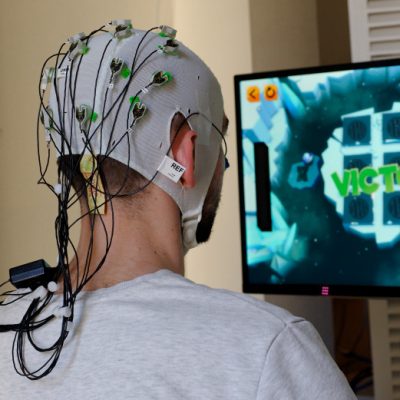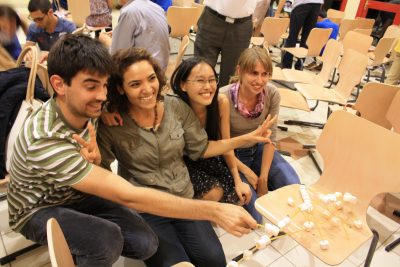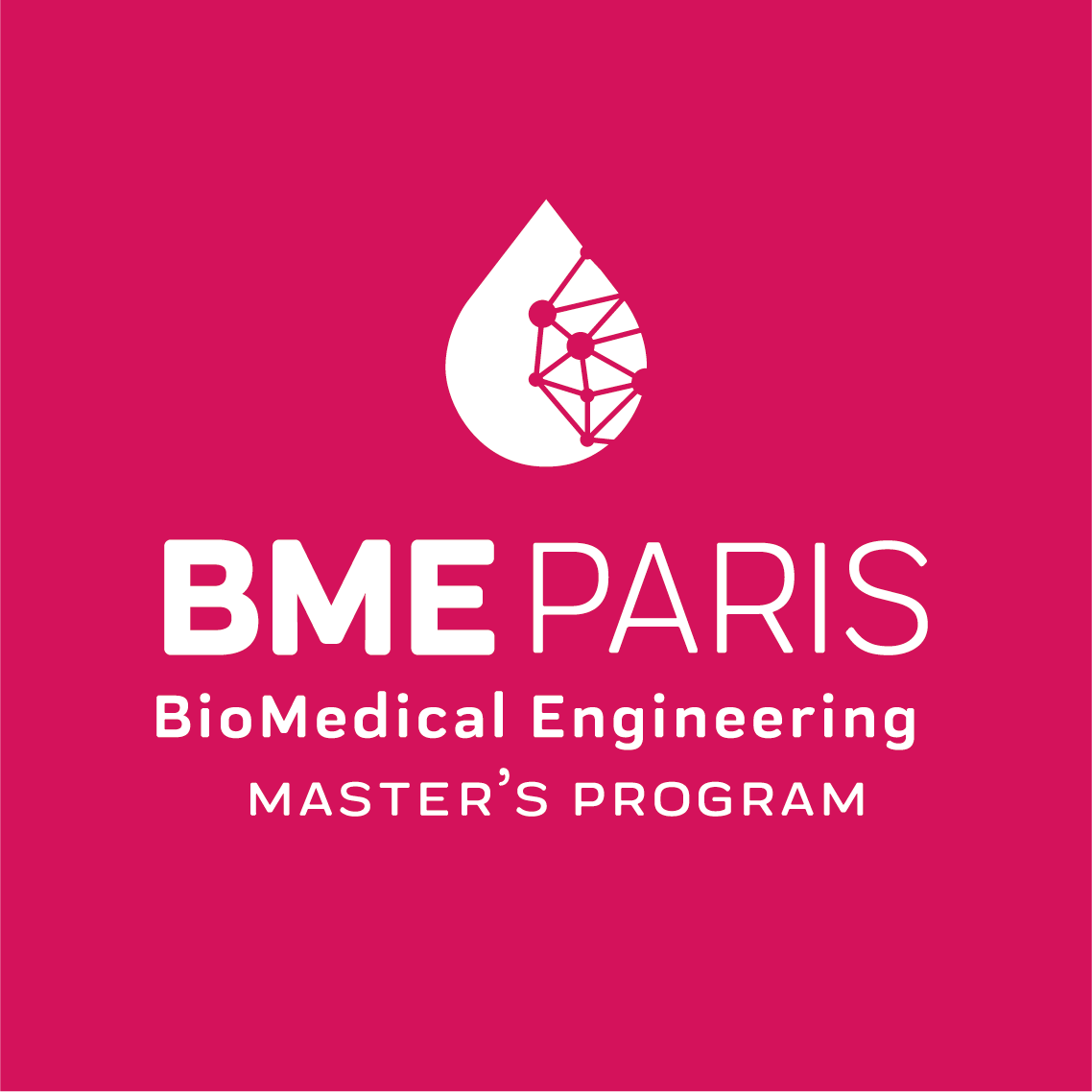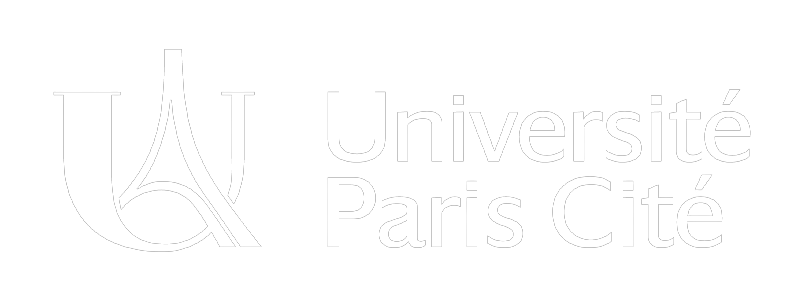Bioengineering and Innovation in Neuroscience
Bioengineering and Innovation in Neuroscience (BIN)
The Bioengineering and Innovation in Neuroscience (BIN) training program, like the other tracks of the BME PARIS master’s program, leaves a wide part to interdisciplinarity. It is designed both for engineering school students, and for university students having a robust initial training in basic science or medicine. Courses will mesh engineering, mathematics, and computer concepts with molecular, cellular and systems neuroscience. This track is hosted by ESPCI Paris, Arts et Métiers ParisTech Institute of Technology and Université Paris Cité.
Innovation in Neuroscience (BIN) training program, like the other tracks of the BME PARIS master’s program, leaves a wide part to interdisciplinarity. It is designed both for engineering school students, and for university students having a robust initial training in basic science or medicine. Courses will mesh engineering, mathematics, and computer concepts with molecular, cellular and systems neuroscience. This track is hosted by ESPCI Paris, Arts et Métiers ParisTech Institute of Technology and Université Paris Cité.
Our ambition is that through courses, seminars, social events, conferences and collaborative interactions, BIN students will contribute to bridge the gap between basic, clinical, and engineering neuroscience. We believe it is a key issue for both industry and medicine in the 21st century, because of :
- aging of the world population, which will considerably increase the prevalence of neurodegenerative diseases, and more generally of sensory and motor handicaps. These will require the development of new biomedical devices and molecular tools to better (i) diagnose neurological diseases, (ii) evaluate their progression or treatment, and (iii) remediate disease- or age-associated handicaps, to which doctors will be confronted increasingly often
- strong demands from a broadening range of industries, way beyond the
biomedical ones, including aviation, automobile, sports, and videogames. There is indeed an increasing need to understand how humans interact with their environments in general and with the new complex working environments of today in particular (human factor). Many industries will thus require engineers with both good engineering skills and basic knowledge of neurophysiology - the requirement of integrative methods and concepts, from the behavioral to the molecular level, to understand how the central nervous system functions, and can be repaired and enhanced. Neuroscience thus cover almost all biomedical technologies and applications. They illustrate well the interdisciplinarity that lies at the heart of biomedical engineering, because they strongly require the collaboration of doctors and engineers, combining many different skills, in optics, electronics, informatics, robotics, physiology, ergonomy, chemistry, etc.
The BIN track has also an industrial orientation, by:
- relying on many lecturers from research and development (R&D) departments of major companies, as well as start-ups. Technical and industrial aspects will be emphasized, but also the eventual entrepreneurial efforts (successful or not) involved
- offering a practical initiation to innovative entrepreneurship through a Business plan workshop (shared with the BioMAT track)
- encouraging students to apply for their 2nd semester internship in an industrial R&D laboratory or a hospital department
Courses
An introductory teaching unit will mainly provide a comprehensive overview of the structure and function of the nervous system. The focus will be both on systems and cellular neuroscience, providing the biological notions required for engineering students to follow the BIN track, while refreshing and/or complementing knowledge previously acquired by science and medical students.
Other courses will cover human-machine, brain-machine and brain-computer interfaces (from principles and design to practical implementation and a wide array of « neuroengineering » applications), the imaging and manipulation of neuronal and brain activity, predictive chemistry for neuroscience (from design to clinical testing), microfluidics and other innovative miniaturized biotechnologies for the nervous system, statistics, computer modeling of neuronal networks and their applications… (more detailed presentations of the courses can be found below).
Career opportunities
The interdisciplinary training and experience acquired through the BIN track provide employment opportunities in numerous professional fields, such as the medical device industry (for medical bioimaging, or advanced sensory and motor remediation), or the pharmaceutical, cosmetics and chemical industries (drug design, biosensors), as well as robotics, or defense, sport, automobile, aviation and videogame industries. The BIN track can also lead to a PhD thesis in an academic or industrial research laboratory, and subsequently to an academic career in the medical or scientific fields.
Semester 3
Mandatory courses
Course Title: Open your mind seminars
Description:
Key words:
Total number of hours: Number of ECTS: Semester
Mandatory course ☐ Optional course ☐
Prerequisites/skills needed:
Teaching methods and activities:
Location:
Course supervisor:
Course Title: Interdisciplinary week
Description:
Key words:
Total number of hours: Number of ECTS: Semester
Mandatory course ☐ Optional course ☐
Prerequisites/skills needed:
Teaching methods and activities:
Location:
Course supervisor:
Course Title: Neuroscience Refresher/Primer
Description: These courses aim at: – providing the basic biological notions required for engineering students to follow the BIN track, while refreshing and/or complementing knowledge previously acquired by science and medical students – encouraging collaborative mutualization of knowledge between the students from different background.
Key words: neuroanatomy, nerve signals, neuronal networks, brain development
Total number of hours: 22 Number of ECTS: 3 Semester 3
Mandatory course ☒ Optional course ☐
Prerequisites/skills needed: Engineering students are advised to prepare for the course by reading the introductory chapters of neuroscience textbooks (e.g. “Fundamental Neuroscience” by Kandel et al, or “Neuroscience” by Purves et al, and “Neuroanatomy” by Crossman & Neary)
Teaching methods and activities: lectures (CM), practical sessions (TD)
Location: université paris cité, Campus Saint-Germain-des-Prés
Course supervisor: Claude Meunier (researcher)
Course Title: A window into the mind : new technologies to explore and stimulate the brain
Description: This UE presents the following topics as 2- to 3h lectures : Overview of the neurophysiological mechanisms related to the different methods of exploration of brain activity – Principles of experimental research in Neuroscience – Exploration of Brain activity: Basic concepts and description of intracranial recordings in behaving animals and optogenetics – Non-invasive exploration and stimulation in human brain: fIRM and TMS – Acoustical brain imaging: from observation to treatment – Optogenetics and machine learning in Neuroscience – Brain imaging with voltage-sensitive dyes – Two-photon microscopy introduction and new evolution: Fast multisite optical recordings with acousto-optic deflectors. The UE also includes one day devoted to presentations of scientific papers by students in front of the class.
Key words: Brain imaging, optogenetics, ultrasound
Total number of hours: 29 Number of ECTS: 3 Semester 3
Mandatory course ☒ Optional course ☒
Prerequisites/skills needed: Some basic neuroscience (cf UE Refresher courses), notions in frequency analysis
Teaching methods and activities: Lectures (CM), other: article presentations by students
Location: ESPCI Paris
Course supervisor: Karim BENCHENANE (researcher)
Course Title: Sensory Supplementation
Description: Sensory supplementation systems for audition, vision, proprioception, gaze and postural control consist of supplying individuals with additional artificial information about sensory information and motion to substitute or supplement the natural visual, auditory, somatosensory and vestibular sensory cues. The aim of this course is to present the concept of the human sensory supplementation. These kinds of supplements have a large range of applications, from medicine to sport and military developments. The various supplements allowing the improvement of the sensory capacities of the human body will be presented and discussed: artificial retinae, vibrotactile prostheses, cochlear implant, cochlear prostheses and vestibular implants.
Key words: Sensorimotor transformation, prosthesis, rehabilitation
Total number of hours: 24 Number of ECTS: 3 Semester 1 and 2
Mandatory course ☒ Optional course ☐
Prerequisites/skills needed: Minimal understanding of the basic mathematical concepts (kinematics, dynamics, Fourier analysis) and of the physiological concepts (basic anatomy and sensory physiology).
Teaching methods and activities: Lectures (CM), other: visits of clinical departments and research groups related to the topics of the courses
Location: université paris cité, Campus Saint-Germain-des-Prés
Course supervisor: Catherine VIDAL (MD-PhD)
Course Title: Motor supplementation and Human Machine Interface
Description:
The aim of this course is twofold.
Firstly, it will present the concept of the human motor supplementation. These kinds of supplements have a large range of applications, from medicine to military developments. The various supplements allowing the improvement of motor capacities of the human body will be presented and discussed: exoskeletons, cognitive robotics, tele-robotics (force-feedback control), orthosis and prosthesis, trans and intra-cranial electrical stimulation, robots for the assistance or for the rehabilitation to walking and grasping.
In addition, Human-Machine Interface has emerged as a key issue for complex systems requiring human operators, mainly due to increased safety at the technical level. Aviation is an exemplary applied field for this statement. As such, the second aim of this course is to browse current human adaptability and limits to understanding, and to expand this approach by dwelling into the question of human behavior quantization. Several applied topics, including simulation, sensor fusion, biomedical monitoring in extreme environments and high-level sport will be used to present state-of-the-art measurement paradigms. The ubiquitous issue of cognitive workload, situation awareness and high-level performance will be presented. Elements of systemic and collective aspects will also be discussed.
Key words: Motor control, BCI, Human factor, Simulator, Interface
Total number of hours: 18 Number of ECTS: 3 Semester 3
Mandatory course ☒ Optional course ☐
Prerequisites/skills needed: Some notions acquired from UE Sensory supplementation
Teaching methods and activities: Lectures (CM)
Location: université paris cité, Campus Saint-Germain-des-Prés
Course supervisor: Stéphane BUFFAT (MD-PhD)
Course Title: Detection of Vigilance States and Communication with the Environment
Description: The aim of this course is to provide students with the different concepts of detection and modulation of vigilance conditions. The influence of the different vigilance states and specially “hypovigilance” on human neuro-sensorials responses will be developed. Various clinical situations of non communicating subjects for whom it is crucial to detect and improve vigilance or consciousness condition will be explored such as during prolonged coma and in wholly paralyzed but conscious subjects. We will examine also new methodologies to improve communication with a severely handicapped subject and the issue of cerebral death. This course is based on theoretical and on practical work sessions and/or on mini projects.
Key words: Vigilance, consciousness, neurological disorders, stroke, traumatic brain injury
Total number of hours: 20 Number of ECTS: 3 Semester 3 and 4
Mandatory course ☒ Optional course ☐
Prerequisites/skills needed: Minimal understanding of the basic mathematical concepts (kinematics, dynamics, Fourier analysis) and of the physiological concepts (basic anatomy and sensory physiology)
Teaching methods and activities: Lectures (CM), other: visits of clinical departments and robotic lab for disabled people
Location: université paris cité, Campus Saint-Germain-des-Prés
Course supervisor: Alexis Schnitzler (PU-PH)
12 ECTS (minimum) to be picked among
Course Title: From real to artificial neurons, and back
Description: The purpose of this teaching unit is to :
– Discover and master the basics of Artificial Intelligence and its most common tools (Tensorflow, Pytorch, AI platform)
– Discover and master the basics of analyzing large datasets. Python, Matlab, dimensionality reduction, linear decoder
– Compare classical and artificial intelligence-based approaches. Understand the logic, advantages and limitations of each approach
– Know and understand the learning rules of real and artificial neural networks. Understand the differences and the potential of each
– Discovery of the rules of human and mammalian learning.
– Use the tools taught to analyze data from different fields. 1) data from academic research in neuroscience, 2) data from biotechnology start-ups on Brain-Computer Interfaces and 3) data from private companies. Use the same tools appropriate to the question being asked. Discover the importance of data structure to use the right tools.
– Generalization of acquired knowledge to different professional opportunities. Discovery of the academic research environment, the private research environment in start-ups and the private nonresearch environment.
Total number of hours: 27,5 Number of ECTS: 3 Semester 3
Mandatory course ☐ Optional course ☒
Prerequisites/skills needed: Basic knowledge of Python and/or Matlab may be useful (cf Research Methodology course)
Teaching methods and activities: Lectures (CM) and Tutorials (TD)
Location: ESPCI Paris
Course supervisor: Karim BENCHENANE (Researcher)
Course Title: Deep learning and neurocomputational projects
Description: The purpose of this teaching unit is to develop students’ autonomy in applying principles of modelling, specifically originating from deep learning approaches, or from theoretical neurosciences. Deep learning projects propose the exploration of Artificial Intelligence methods and algorithms in data analysis tasks, while Neurocomputational projects apply computational approaches to the modelling and understanding of neuronal processes (the connection between biology and AI being a possible topic).possible topic).
Total number of hours: 28 Number of ECTS: 3 Semester 3
Mandatory course ☐ Optional course ☒
Prerequisites/skills needed: for deep learning projects, prior attendance to « From real to artificial neurons, and back » is mandatory
Teaching methods and activities: Practicals (TP) and Tutorials (TD)
Location: ESPCI Paris (Deep learning projects) or UP Campus St-Germain (Neurocomputational projects)
Course supervisor: Karim BENCHENANE (Researcher) or Samuel BOTTANI (Professor)
Course Title: Miniaturisation for neuroscience
Description: These courses will provide the general context of the recent surge of microfluidics (including social and economic issues), introduce the relevant basic physical concepts (hydrodynamics at the microscale, droplet-based microfluidics, diffusive process and mixing…), and provide a wealth of practical applications, focusing on the contribution of microtechnologies, including microfluidics, in cell biology in general and in neuroscience in particular. Courses will include 2 lab sessions involving primary cultures of neurons, where the students will make their own microfluidic chip.
Key words: Microfluidics, cell culture, in vitro models, neurodegenerative diseases
Total number of hours: 22 Number of ECTS: 3 Semester 3
Mandatory course ☐ Optional course ☒
Prerequisites/skills needed: Some notions in physics (Bachelor level)
Teaching methods and activities: Lab sessions (TP), lectures (CM)
Location: ESPCI Paris
Course supervisor: Jean-Michel Peyrin (researcher)
Course Title: Drug design for neurological diseases
Description: The main objective of this course is to show how bioactive molecules can be obtained and developed until they reach the market, in order to treat neurological diseases, in particular Parkinson’s and Alzheimer’s diseases. Addiction will be presented as an example of neuropsychiatric disorder. The students will be also introduced to various approaches to drug discovery, including electrophysiology and the use of molecular modeling, which can also be a good tool to study the mechanisms of drug action. The synthesis of biologically active compounds as well as the biological tests and the different ways to evaluate the activity of these compounds will be presented. Lecturers will include industry researchers.
Key words: Pharmaceutical industry, clinical trials, neurodegenerative diseases, addiction
Total number of hours: 20 Number of ECTS: 3 Semester 3
Mandatory course ☐ Optional course ☒
Prerequisites/skills needed: Basic notions about neurotransmission (cf UE Refresher courses)
Teaching methods and activities: Lectures (CM)
Location: université paris cité, Campus Saint-Germain-des-Prés
Course supervisor: Nicolas MARIE (researcher)
Course Title: Movement analysis and locomotion
Description: This UE gives some fundamental knowledges on the concept of modelling the human body as an articulated rigid body chain for kinematic and dynamic analysis of the motion. Students are separated in 3 groups according to their initial level evaluated through a written test. The addressed notions are the same in the 3 groups but the deepening and the autonomy in the handling of the concepts are adapted according to the group. It is composed of 6 classes of 4 hours alternating lectures and practical session and giving some skills in motion capture and analysis :
– Mathematical reminders
– General presentation of motion analysis + evaluation
– Method of determination of the position of a rigid body (a vertebra)
– Notion and determination of anatomical frames and inverse dynamics
– Clinical cases of motion analysis (cervical spine kinematics )
– Kinematic analysis of a squat motion from experimental data.
Key words: Motion capture, 3D kinematics, anatomical interpretation, inverse dynamics
Total number of hours: 24 Number of ECTS: 3 Semester 3
Mandatory course ☐ Optional course ☒
Prerequisites/skills needed: Basics in kinematics, basics in linear algebra and geometry
Teaching methods and activities: Lab sessions (TP), lectures (CM)
Location: Arts et Métiers
Course supervisor: Hélène PILLET (associate professor)
Course Title: Research Methodology
Description:
Key words:
Total number of hours: Number of ECTS: Semester
Mandatory course ☐ Optional course ☐
Prerequisites/skills needed:
Teaching methods and activities:
Location:
Course supervisor:
Depending on capacity and subject to track chairs’ authorization, the following teaching units may be chosen outside of the track :
Course Title: Quantification for Neuroimaging
Description: The module aims at providing students with an insight on advanced methods in data modelling and analysis as used in neuroimaging research labs. The methods are selected to present four differents aspects of brain acitivity and connectivity: – diffusion MRI and tractography – activation fMRI and activation networks – resting state fMRI and resting state connectivity – Magneto Encephalography and source reconstruction Each lecture starts with a presentation of the critical theoretical knowledge regarding the neuroimaging modality, the specificities of the generated data, and the methodology for image analysis. Then, praticals on state-of-the-art softwares and real datasets provide hands-on experience of data processing. This interplay between theory and practice teaches students how to apply their knowledge and skills to handle cutting-edge methods applied to neuroimaging data and how to consider the limitations of such methods and their impact on the interpretation of results. Critically, the lectures present various methodological developments to overcome these issues (artifact correction, bias modeling,…).
Key words: Functional MRI, Electroencephalography, Magnetoencephalography
Total number of hours: 20 Number of ECTS: 3 Semester 3
Mandatory course ☐ Optional course ☒
Prerequisites/skills needed: Linear algebra, Basic programming skills (Matlab or Python)
Teaching methods and activities: Lectures (CM), practical sessions (TD), other: personal assignment
Location: Arts et Métiers
Course supervisor: Alexandre GRAMFORT (researcher) and Sylvain CHARRON (researcher engineer)
Course Title: Machine Learning for Bioimaging
Description: – Learn the principles and hypothesis behind the different machine learning techniques – Understand the pros and cons of every method – Learn how to use them on real high-dimensional biomedical imaging data (Big Data) – Use different techniques in practice.
Key words: Statistical machine learning, deep learning
Total number of hours: 24 Number of ECTS: 3 Semester 3
Mandatory course ☐ Optional course ☒
Prerequisites/skills needed: Basic courses in Linear Algebra, Statistics, Optimization and Programming (for clinicians this is not mandatory but they must be willing to code and see equations during the lectures …)
Teaching methods and activities: Lectures (CM), practical sessions (TD)
Location: Arts et Métiers
Course supervisor: Pietro GORI (associate professor) and Petr DOKLADAL (researcher engineer)
Course Title: Principles in tissue engineering
Description: This lecture delivers an advanced knowledge of the concepts and issues associated with tissue engineering approaches for regenerative medicine. From a scientific and a technological point of view, this field of bioengineering requires the proper combination of biology, medicine, chemistry and physics. These questions are addressed by different experts from the stand points of engineering and health sciences. Through these classes and case studies, the students are also sensitized to the numerous other challenges that must be taken into account in tissue engineering (clinical practice, regulatory issues, process). The six classes are organized as follows: 1 – Introduction to tissue engineering; 2- Tissue engineering principles; 3- Materials and process to design tissue engineering products; 4- Nanotechnology and biophysics for tissue engineering; 5- Stem cells: potential, characterization and manipulation of stem cells for tissue engineering approaches; 6- Development and bench-to-bed transfer of a tissue engineering strategy. In parallel to the classes, team projects are conducted to study the feasibility of a tissue-engineering based therapy.
Key words: Tissue engineering, Regeneration, Scaffold design and processing, Cell seeding and manipulation
Total number of hours: 18 Number of ECTS: 3 Semester 3
Mandatory course ☐ Optional course ☒
No prerequisites/skills needed.
Teaching methods and activities: Lectures (CM)
Location: Arts et Métiers
Course supervisor: Laurent CORTÉ (professor)
Course Title: Muscular system modeling
Description: This lecture provides student with basic knowledge on physiology and biomechanics of the skeletal muscle with the aim of modeling and simulating the mechanical behavior of the skeletal muscle in vivo. This knowledge is needed to understand and to analyze the human motion as well as to quantify the stress applied on bones and articular surfaces. To initiate students to this important biomechanics field, this lecture is composed of 4 parts:
– Physiology of muscle contraction (composition and architecture of the skeletal muscle, mechanics of the muscle contraction, muscle activation)
– Mechanical behavior of skeletal muscles (passive and active mechanical behavior of the skeletal muscle)
– Mechanical modeling of skeletal muscles (mechanical models of the skeletal muscle)
– Introduction to musculoskeletal modeling
This lecture relies on various tutorial and practical sessions leading student to initiate a modeling process and to perform simulations and experimentations? The experimental equipment is present on the ENSAM site and also partly used in the lecture on Movement Analysis.
Key words: Muscles, mechanical behaviour of muscular tissue, musculoskeletal modeling
Total number of hours: 24 Number of ECTS: 3 Semester 3
Mandatory course ☒ Optional course ☐
No prerequisites/skills needed.
Teaching methods and activities: Lectures (CM), practical sessions (TD)
Location: Arts et Métiers
Course supervisor: Christophe SAURET (associate professor)
Course Title: An introduction to Virtual Reality and Augmented Reality in the biomedical field
Description: This UE aims at introducing students to virtual reality (VR) and augmented reality (AR) as well as showing the numerous possible applications of these technologies in the biomedical field. Introductory lectures will explain the various technologies used nowadays, their advantages and limitations. These lectures will be complemented by demos (TD) and by practical workshops on the programming of basic VR applications (TP) that will allow student to familiarize with VR and AR. Students will also have to complete a bibliographic project about an application of VR or AR based on the available literature and the knowledge acquired in visiting in scientific laboratories and private companies.
The approached fields will be: 1) Applications of VR to the study of multi-sensory integration, motor control and body scheme plasticity, 2) VR application in the medical field (neurological rehabilitation, cognitive remediation, treatment of phobias and tinnitus, professional training), 3) VR and human body biomechanics, 4) AR applications in the medical field and in surgery for teaching, training and clinical purposes, 5) AR and ergonomics.
Key words: Virtual Reality, Augmented Reality, Neuroscience, Biomechanics, Ergonomics
Total number of hours: 24 Number of ECTS: 3 Semester 3
Mandatory course ☐ Optional course ☒
No prerequisites/skills needed.
Teaching methods and activities: Lab sessions (TP), lectures (CM), practical session (TD)
Location: université paris cité, Campus Saint-Germain-des-Prés
Course supervisor: Michele TAGLIABUE (research engineer)
Course Title: Mastering Virtual reality and Augmented Reality
Description: This UE aims at deepening the knowledge acquired in the UE “An introduction to Virtual reality and Augmented Reality in the biomedical field”. New topics will be addressed: 1) Creation and use of virtual environments to investigate human behaviour (memory, navigation, executive control), 2) Mixed Reality, 3) Real-time interactions with the environment 4) Virtual reality, augmented reality, mixed reality and handicap, 5) Potential and limitations of these techniques
Students will follow introductory lectures, but mainly perform practical work on applications of these technologies to the biomedical field. They will learn to create simple virtual environment using the UNITY 3D programming software, to create and manipulate avatars and to program augmented reality and mixed reality applications for Microsoft Hololens or similar devices. Students will be asked to work individually or in couple on two small projects, in which they will apply Virtual or Augmented Reality technologies in the biomedical field.
Key words: Virtual reality, Augmented reality, Mixed reality, Programming, Unity 3D
Total number of hours: 24 Number of ECTS: 3 Semester 3
Mandatory course ☐ Optional course ☒
Prerequisites/skills needed: Attend the UE “An introduction to Virtual reality and Augmented Reality in the biomedical field”
Teaching methods and activities: Lab sessions (TP), lectures (CM), practical sessions (TD), other: personal and team projects
Location: université paris cité, Campus Saint-Germain-des-Prés
Course supervisor: Michele TAGLIABUE (research engineer)
One course (3 or 6 ECTS) in Neuroscience track of the PSL Life Science Master
Semester 4
Mandatory courses
Course Title: Research Internship
Description: Students are encouraged to write a 5-year plan and discuss it with track chairs before contacting labs for internships, so they have a clear idea of what would suit their aspirations best, e.g. a clinical lab or project might be more appropriate for a student aiming for medical school (“passerelle”). An exhaustive list of labs/institutions, as well as specific projects received from lab heads, may be suggested to students looking for internship positions. A student’s final choice MUST be validated by track chairs. They will evaluate the proposed internship project mainly according to its adequacy to the student’s skills and objectives, its scientific quality, the lab/team record and the number of M2 students it will be hosting during the same period. The student’s work will be evaluated from an oral defense in front of a jury (50%) and a written report (50%).
Total number of hours: 5-6 months full time Number of ECTS: 26 Semester 4
Mandatory course ☒ Optional course ☐
Prerequisites/skills needed: UE Methodology provides some useful notions
Teaching methods and activities: mentoring by internship supervisor(s)
Exact location: An academic, industrial or clinical lab validated by track chairs
Course supervisors: André KLARSFELD (Professor), Pierre-Paul VIDAL (MD-PhD)
Course Title: Business Plan Workshop
Description: This 1-week workshop will teach how to manage, as a team, the creation of an innovative company (start-up). It will illustrate all aspects of project building, up to a Business plan and its oral presentation. Students will be coached by professionals throughout the workshop. Biomedical entrepreneurs and venture capital experts will be invited to share their hands-on experience. The objectives of the workshop are: – increasing the autonomy of the students – teaching them how to take risks – teaching them how to work responsibly and coherently as a team – providing them with the necessary economic concepts and practical tools.
Key words: entrepreneurship, business model, start-up, innovation, venture capital
Total number of hours: 35 Number of ECTS: 3 Semester 4
Mandatory course ☒ Optional course ☐
No prerequisite
Teaching methods and activities: lectures (CM), practical sessions (TD), teamwork
Location: Arts et Métiers ParisTech or ESPCI Paris
Course supervisor: Catherine LEGER-JARNIOU (Professor), André KLARSFELD (Professor)
Course Title: Ethical Aspects of Biomedical Engineering
Description:
Key words:
Total number of hours: Number of ECTS: Semester
Mandatory course ☐ Optional course ☐
No prerequisite
Teaching methods and activities:
Location:
Course supervisor:
NB. No schedule or syllabus will be provided before the kick-off meeting. You must know that it is a full-time program though.
As far as the non mandatory courses are concerned, the students’ choices will have to be discussed with the track chairs and will be finalized during the interdisciplinary week, taking the student’s personal background and interests into consideration. It will then be validated in a co-signed contract of study.
The courses students will eventually attend will also depend on actual availability: some courses might not open because of an insufficient number of attendees, while others may have a limited capacity and not be able to offer a seat to all.
As indicated, a course may be offered to BME Paris students outside the track which supports it. In such cases, priority will be given to students enrolled in the supporting track.
Students enrolled in other Arts et Métiers, Université Paris Cité or Université PSL programs may also attend a BME Paris course, provided that:
- their respective program chairs support their application
- the course is not already full
- the relevant BME Paris chairs accept their applications which must include a CV and a motivation letter






